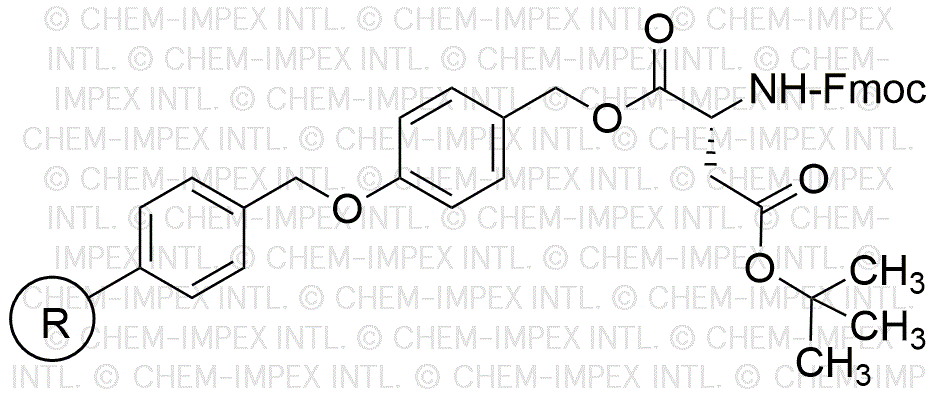Fmoc-D-aspartic acid b-tert-butyl ester 4-alkoxybenzyl alcohol resin is widely utilized in research focused on:
- Peptide Synthesis: This compound serves as a key building block in solid-phase peptide synthesis, allowing for the efficient assembly of peptides with specific sequences.
- Drug Development: It plays a crucial role in the development of peptide-based therapeutics, providing a platform for creating novel drug candidates with enhanced efficacy.
- Bioconjugation: The resin can be used to attach peptides to various biomolecules, facilitating the study of protein interactions and the development of targeted therapies.
- Research in Neuroscience: Its derivatives are often explored in studies related to neurotransmission and neuropharmacology, contributing to the understanding of neurological disorders.
- Custom Polymer Production: The resin can be tailored for specific applications in materials science, enabling the creation of polymers with unique properties for various industrial uses.
Informations générales
Propriétés
Sécurité et réglementation
Applications
Fmoc-D-aspartic acid b-tert-butyl ester 4-alkoxybenzyl alcohol resin is widely utilized in research focused on:
- Peptide Synthesis: This compound serves as a key building block in solid-phase peptide synthesis, allowing for the efficient assembly of peptides with specific sequences.
- Drug Development: It plays a crucial role in the development of peptide-based therapeutics, providing a platform for creating novel drug candidates with enhanced efficacy.
- Bioconjugation: The resin can be used to attach peptides to various biomolecules, facilitating the study of protein interactions and the development of targeted therapies.
- Research in Neuroscience: Its derivatives are often explored in studies related to neurotransmission and neuropharmacology, contributing to the understanding of neurological disorders.
- Custom Polymer Production: The resin can be tailored for specific applications in materials science, enabling the creation of polymers with unique properties for various industrial uses.
Documents
Fiches de données de sécurité (FDS)
La FDS fournit des informations de sécurité complètes sur la manipulation, le stockage et l’élimination du produit.
Spécifications du produit (PS)
Le PS fournit une description complète des propriétés du produit, notamment sa composition chimique, son état physique, sa pureté et les exigences de stockage. Il détaille également les plages de qualité acceptables et les applications prévues du produit.
Certificats d'analyse (COA)
Recherchez des certificats d'analyse (COA) en saisissant le numéro de lot du produit. Les numéros de lot et de lot se trouvent sur l'étiquette d'un produit, après les mots « Lot » ou « Lot de fabrication ».
Numéro de catalogue
Numéro de lot/série
Certificats d'origine (COO)
Ce certificat d'exploitation confirme le pays dans lequel le produit a été fabriqué, et détaille également les matériaux et composants utilisés et s'il est issu de sources naturelles, synthétiques ou autres sources spécifiques. Ce certificat peut être requis pour les douanes, le commerce et la conformité réglementaire.
Numéro de catalogue
Numéro de lot/série
Fiches de données de sécurité (FDS)
La FDS fournit des informations de sécurité complètes sur la manipulation, le stockage et l’élimination du produit.
DownloadSpécifications du produit (PS)
Le PS fournit une description complète des propriétés du produit, notamment sa composition chimique, son état physique, sa pureté et les exigences de stockage. Il détaille également les plages de qualité acceptables et les applications prévues du produit.
DownloadCertificats d'analyse (COA)
Recherchez des certificats d'analyse (COA) en saisissant le numéro de lot du produit. Les numéros de lot et de lot se trouvent sur l'étiquette d'un produit, après les mots « Lot » ou « Lot de fabrication ».
Numéro de catalogue
Numéro de lot/série
Certificats d'origine (COO)
Ce certificat d'exploitation confirme le pays dans lequel le produit a été fabriqué, et détaille également les matériaux et composants utilisés et s'il est issu de sources naturelles, synthétiques ou autres sources spécifiques. Ce certificat peut être requis pour les douanes, le commerce et la conformité réglementaire.

